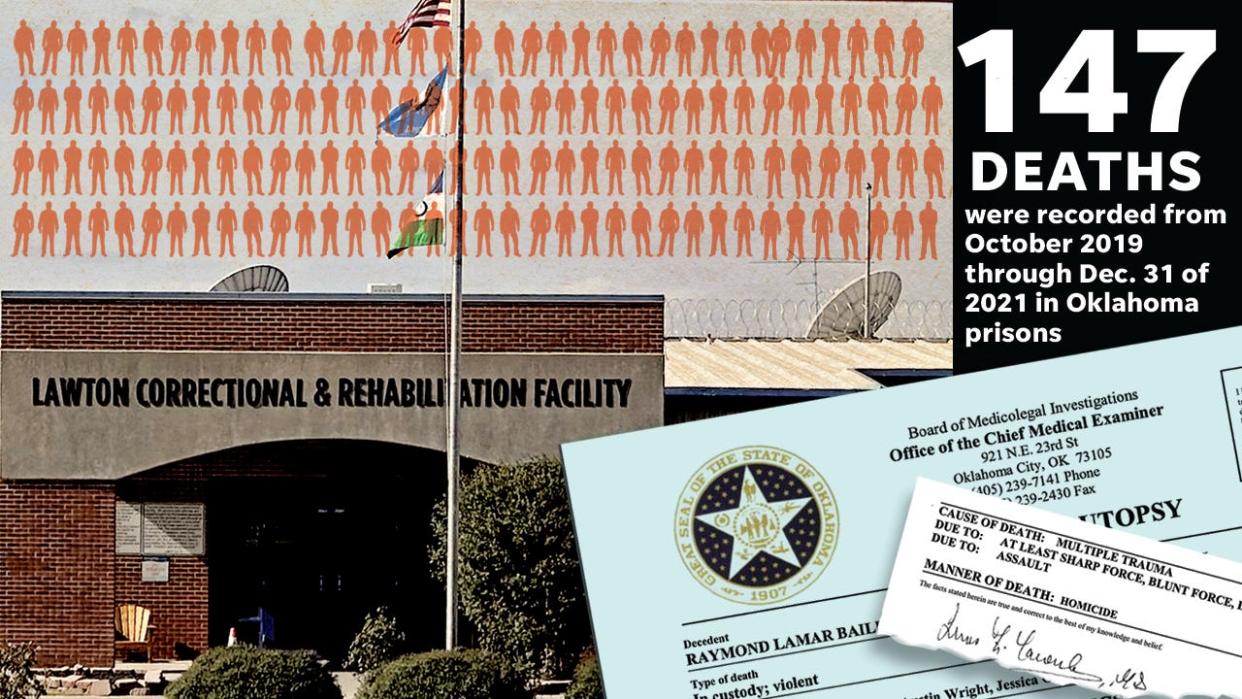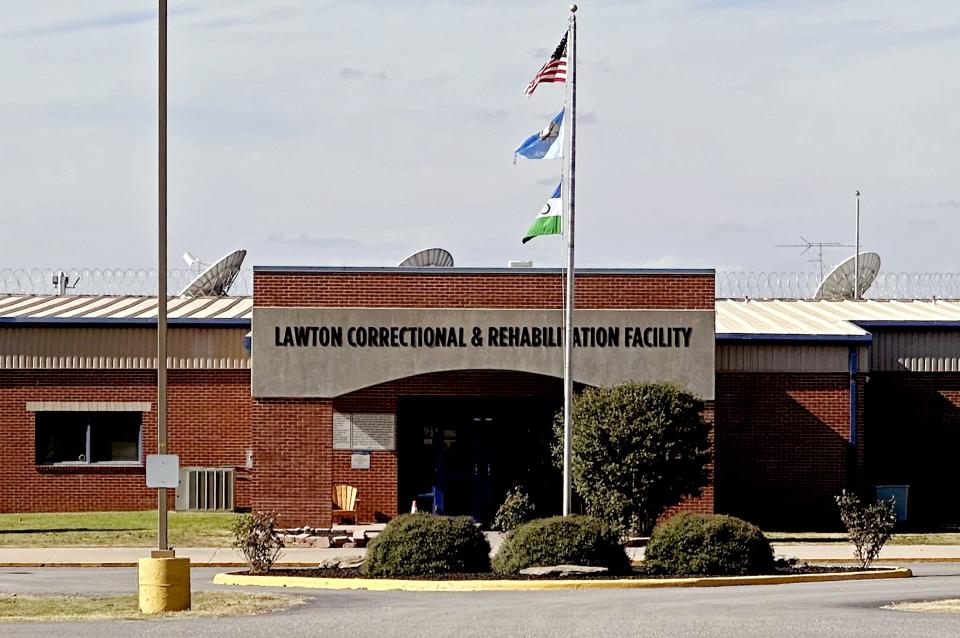'Tears and fears.' Inmate killings, violence continue to plague Oklahoma's corrections system

- Oops!Something went wrong.Please try again later.
Editor's Note: This is the first story in an occasional series that examines problems with the Oklahoma Department of Corrections, its management and its facilities.
The last time anyone saw Raymond Bailey alive was several hours before he was found dead in a garbage bin, covered by a plastic bag with four small milk cartons tossed on top.
Bailey was brutally attacked and killed last October at the Lawton Correctional and Rehabilitation Facility.
Officials from the Oklahoma Department of Corrections haven’t spoken much about Bailey's death. And though they did refer the incident to the Comanche County district attorney's office for investigation, today, nearly four months after his death, little is known about exactly how Bailey was killed or why.
Records show that Bailey was stabbed sometime before the morning of Oct. 26, but corrections officials don't know when, according to documents obtained by The Oklahoman. An autopsy report, released by the state medical examiner’s office, said Bailey was stabbed and slashed at varying depths many times on his head, neck and upper torso.
Kay Thompson, Corrections Department chief of media relations, said the investigation into Bailey's death wouldn't be ready until after March 7. She said the Comanche County district attorney’s office has taken over a criminal investigation into Bailey’s death from the department.
More: Lawton inmate was denied medical care for four days before he died, lawsuit says
Thompson said Corrections Department officials believe Bailey died between 5 and 6 a.m. The department and the private owner, The Geo Group Inc., conducted an “After Action Review” with seven committee members between the two entities. In its initial review, multiple corrections and company policies were violated during the early morning hours of Oct. 26, including not properly conducting counts.
She added the department monitors staffing levels at the Lawton correctional facility and said they are within the contractually set amounts. Thompson said department's Office of the Inspector General immediately launched an administrative investigation and a criminal investigation, assisted by the Oklahoma State Bureau of Investigation. That investigation is still underway.

According to the autopsy, Bailey had a wound over his left ear and enough stab injuries to the neck to cause a broken cricoid cartilage, the only structure that completes a full circle around a person’s airway. Bailey's hands were bound, and he was gagged. His ankles were tied together with a pair of his pants that had been hemmed into shorts and had pockets sewn into them.
At Lawton, Bailey was serving a combined 60-year sentence for second-degree murder, carrying a firearm after a previous felony conviction and possession of a controlled substance.
Bailey was one of at least four inmates who were killed in 2023 while in Corrections Department custody. Records show that over the past several years, the number of inmate killings at state prisons has dramatically increased.
Inmate deaths on the rise in state prisons
Records obtained through the Open Records Act indicate that 12 inmates in Corrections Department custody were killed during the three-year period 2021-2023, four each year. That's a jump from the single homicides recorded in 2019 and 2020.
However, 147 other inmate deaths over the five-year period are still under investigation, and some may ultimately be determined to be homicides. Over the same period, 357 inmate deaths were investigated and listed as natural causes, accidents and suicides.
All 516 deaths were contained in a report from the District Attorneys Council, which is sent to the federal Bureau of Justice Assistance (BJA).
The inmate deaths come at the same time the Corrections Department is facing intense criticism about inmate punishment and unsafe conditions for both inmates and department staff at state facilities.
According to a Bureau of Justice Assistance report, during the period 2001-2019, Oklahoma had the second-highest average annual homicide rate in the nation's state prisons — 14 per 100,000. Homicides were 4% of all inmate deaths during that time in Oklahoma.
Other reports obtained by The Oklahoman detailed the stabbing of a guard, inmate violence, no heat, water rationing and other incidents Dick Conner Correctional Center in Hominy.
At the Great Plains Correctional Center in Hinton, 17 inmates were kept in shower stalls for days at a time without water, bathroom breaks and mattress pads, incident reports from August 2023 show.
Corrections Department officials told media members the inmates were placed in the shower stalls due to overwhelmed or refused housing.

Nightmarish problems at the Lawton Correctional and Rehabilitation Facility
The Lawton Correctional and Rehabilitation Facility is owned and run by The GEO Group Inc., headquartered in Boca Raton, Florida. The Oklahoma Corrections Department has been considering the possibility of the state taking over the facility, Thompson told the Southwest Ledger in January.
Lawton is the last remaining private prison facility in Oklahoma, though the state leases the Great Plains Correctional Center from The GEO Group.
State Rep. Justin Humphrey, R-Lane, chairs the House of Representatives' Criminal Justice and Corrections Committee. For several months, Humphrey raised concerns about the management of Corrections Department, its leadership and whether or not staff and inmates were safe. This year Humphrey said he wanted an outside investigation of the system. He invited three former employees to the committee on Feb. 14 to share their experiences.
Luke Pettigrew told the committee he had worked in the department two separate times since he was 21 years old, on every level of security and in seven different facilities throughout his career, spending the last four years as a warden at Joseph Harp Correctional Center in Lexington. He said there was once a waiting list to work at the department when he first started, and enough staff to attend training and not feel guilty about calling in sick.
More: Lawmaker calls for 'independent investigation' of Oklahoma Department of Corrections
“I love my job. I’ve given my life. I moved my family time and time and time again to help better myself, plus spread my knowledge of prison life, you could say,” Pettigrew said. When he returned in 2018, he said it was a big surprise to him that staff levels were low and the situation was dangerous inside the prisons.
“I’m here because I care for the department,” he said.
Pettigrew said it wasn’t uncommon for him and others to be called in two or three times a week to fill staff shortages. He said the shortages and a lack of training contributed to increased violence and contraband coming into the prison.
“What we’re faced with today, it’s just scary,” Pettigrew said.
He added that staff used to work eight-hour shifts and were able to go home to their families, but the correctional officers who work 60 to 70 hours a week now don't have a family life.
No way to feed the inmates
Julie Thompson, a nationally registered and licensed dietician in Oklahoma and Kansas, worked at the department for 10 years, after working her way up from food service manager to compliance manager and then food service operations administrator. She told Humphrey's committee that she left the department after seeing multiple issues at the Great Plains Correctional Center when it opened in spring 2023.
Before the facility opened, Thompson told the committee she was called into a brief meeting, and asked what it would take to open a new kitchen. She told them it would take a lot of planning to put the necessary processes in place. However, she said she received a phone call to report to Oklahoma City at 8 a.m. and was told she had two weeks to open the new kitchen for 2,000 inmates.
Thompson said she, her supervisor and several members of her auditing and compliance team scrubbed that kitchen top to bottom. The first question she asked was if the facility had a food service license from the Oklahoma State Department of Health. Prison management said they didn’t know but believed The Geo Group Inc.'s food license covered them. It would not. Thompson said she got the fastest temporary license ever in three days.
More: Oklahoma needs $25 billion to fix crumbling infrastructure. But the focus is on tax cuts
Thompson said the kitchen barely had enough pots and pans to prepare three meals a day for 2,000 inmates. Thompson said the facility had no vendors set up, no food, no staff and no trash service.
“My team and I were told to perform a miracle,” she told the committee. “I went home that Friday in tears. I drove home to Kansas in absolute tears and fear.”
Statistically, prison riots often start in food service and medical areas, Thompson told the committee. She said if she and her team got it wrong, there was a huge potential for violence. The number of inmates that she would be responsible for feeding every day changed dramatically when the facility opened. The original numbers went up by 20%.
“It was very poor planning, and in fact, sometimes it felt like there was absolutely no planning, no processes in place whatsoever,” she said.

Thompson said Corrections Department Director Steven Harpe visited the facility on June 2, a month after it opened. The kitchen still didn’t have staff members, so Thompson and her team ran it, working 60-plus hours a week. Thompson worked 76 hours a week once, even though she wasn’t eligible for overtime, only comp time.
Harpe shook her hand and asked how it was going. Thompson said, “Sir, you do not want my answer.” He said he did. She pulled him into her office for a private conversation with her supervisor. Thompson told him that she was terrified every day of losing her job, along with her supervisor. It was the culture that scared her the most, because if something went wrong, someone had to be blamed. Despite the violence, the bigger stressor was losing her job.
Acting on Harpe's request, Thompson told the committee she scheduled a meeting with him, but that meeting was canceled three days later by an email from Harpe’s secretary, which said, “I giveth and I taketh away :-(. Director just let me know that his Thursday plans have changed due to an unavoidable conflict. We aren’t sure what day he will make it to Hinton but we will continue to keep you updated once we know. I did advise him of your offer to drive to headquarters but he doesn’t want you to be inconvenienced in any way."
More: Oklahoma County commissioners choose Grand Boulevard land as jail's new home
On July 4, Thompson told the committee she arrived at midnight to work in the kitchen. Unit administrators are not normally in the kitchen running a shift, but because they were so shorthanded, she was usually there running shifts daily and even running meals to inmates in other pods and other units, she said.
That was the final straw for Thompson.
“I could no longer ask my staff members, the people I was told to protect, people that are my family, I could not protect them from what was going on and no one was listening,” she said.
Thompson said she submitted her letter of resignation on the same day, writing that she realized the department "exploits and abuses grit and perseverance." She told the committee the department did offer for her to take as much time off as she needed, or to work from her main office, but they would not extend the same options to her team, so she said no.
Thompson tried two more times to reschedule the meeting after she sent her resignation letter. At one point, the response was, “Good morning, Julie. At this time Director Harpe is choosing to not schedule a meeting. Thank you for following up,” she said.
Thompson said she lost her comp time when she refused to renew and approve the master menu for the next year. If an issue arose with the menu, she wouldn’t be there to address it. It had last been approved July 29, 2022, a year ago, she said.
In a later interview with The Oklahoman, she reinforced her testimony to the legislative committee: “They (the inmates) are a human being. No matter what they did, no matter what their past is, they are still a human being, and it was not my job to sentence them,” she said. “My job was to make sure that they got the meals they deserved.”
Staff shortages putting employees at risk
Jason Lemons told the committee he started his career in 2003. He was Officer of the Year two times, received a Medal of Valor, was named Supervisor of the Year and worked his way up to chief of security at Vinita and then at Dick Conner facility in Hominy in 2023. He fell short of his 25-year career goal by two years when he left because of staff shortages and increasing violence and turning down a deputy warden position.
Lemons told the committee he disagreed the Corrections Department's contention that the inmate to security staffing ratio at Dick Conner was 15 to 1, which he said would mean there were 83 officers working. He said when he was chief of security, there were about 1,250 inmates, and he would run the prison with 12 to 14 officers for the whole shift. He calculated he would need 26 to run the prison properly. Many times, critical posts like towers and yard officers were unable to be manned due to the shortage.
Lemons said inmate on staff incidents at Dick Conner have increased, as well, resulting in officers being stabbed or assaulted. He encouraged an investigation into the numbers, staff shortages and increase in violence. He said officers call him daily and weekly about how dangerous the prisons are becoming.
After a particular incident, Lemons told The Oklahoman, a corrective action is issued telling prison leadership how to fix the problem, such as making sure areas have security staff and installing more cameras. However, he said often there was not enough staff available to carry out the required actions. When an incident happens again, blame comes back to the wardens and deputy wardens, Lemons said.
Lack of staff leads to increased violence
Lemons told the committee the Corrections Department has faced criticism in the past and said he was not sure why state officials did not seem to care about the issues. He said employees were at risk, but so were inmates, most of whom, he said, were just trying to do their time and serve their sentence.
“Most of the inmates want to be protected,” he said. “A lot of these inmates are just scared to death.”
While former employees are speaking out or filing lawsuits, current employees are still working in dangerous conditions, Lemons told the committee, adding that he encouraged them to keep speaking out and bringing issues to light.
“It seems like before people listen to prison issues, it seems like there has to be a full-blown riot or something major to happen before everybody starts listening to that,” Lemons said.

Humphrey said he wants to subpoena records to verify information, and the department has not previously responded to his requests. Pettigrew said he was told to refer Humphrey’s office to department headquarters and not give him any information.
Humphrey said the department is losing all its experienced staff. Still, for employees such as Lemons and Julie Thompson, the problems at the department are overwhelming. Lemons told the committee that he's afraid of the future.
“I don’t know if it’s because it’s a prison and nobody really cares … but we’re getting to a point now to where something serious, you mark my words, we’re going to have a major riot or there’s going to be some officers getting killed,” he said. “In 22 years … I’ve never seen anything like the shape that the Department of Corrections is in right now.”
This article originally appeared on Oklahoman: Oklahoma's corrections system plagued by violence, little staffing

